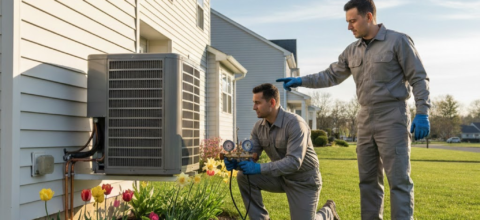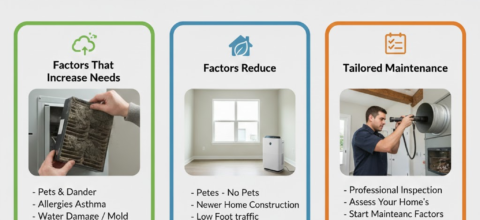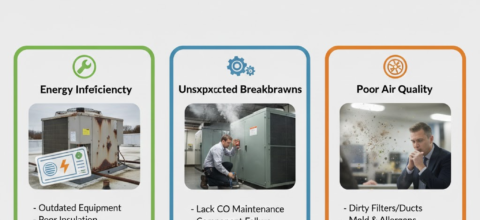Ragweed Season in Ocean County: A Toms River Resident’s Guide to Surviving Fall Allergies
Fall in New Jersey brings beautiful colors and crisp air that draws everyone outdoors. But for allergy sufferers in Ocean County, late August also signals the start of ragweed season – weeks of sneezing, watery eyes, and congestion that can make even the nicest autumn day miserable.
What Is Ragweed and Why Does It Love Toms River?
Ragweed is a common weed that produces massive amounts of pollen and is one of the biggest seasonal allergy triggers. A single plant can release up to one billion grains during peak season. This weed thrives in Ocean County’s coastal climate, especially in disturbed soil along roadsides, vacant lots, and construction sites throughout Toms River. The lightweight pollen travels for miles on wind, so even if you don’t have ragweed in your yard, you’re still exposed.
Where Ragweed Grows Around Here
You’ll find the heaviest concentrations near Route 37, along Garden State Parkway corridors, and in undeveloped areas around Cattus Island County Park. Construction zones and recently cleared land are perfect spots for these weeds. Even waterfront properties near Barnegat Bay get hit when offshore winds carry pollen inland.
When Ragweed Season Hits Ocean County the Hardest
Ocean County residents face the worst ragweed exposure from late August through mid-October. Pollen counts hit their highest levels on warm, dry mornings between 6 AM and 10 AM. Rainy days give you a break, but counts spike again once things dry out. The first hard frost, usually in late October or early November, finally ends ragweed season.
Morning dew keeps pollen on the ground early in the day. But as temperatures rise and humidity drops, billions of particles become airborne. Wind patterns common along the Jersey coast during fall can carry ragweed pollen dozens of miles.
How to Breathe Easier When Pollen Counts Are High
Simple Daily Habits That Help Your Allergies
Check pollen forecasts before making outdoor plans, especially for morning activities. Apps and weather services give real-time pollen counts for Ocean County. After being outside, change clothes right away and shower to wash pollen off your hair and skin.
Keep windows closed in your home and car – use air conditioning instead. This prevents pollen from getting inside and settling on furniture, bedding, and clothes. Run your AC continuously during high pollen days to keep allergens out.
Still Want to Enjoy the Outdoors?
Don’t let ragweed stop you from enjoying fall weather at the Jersey Shore. Plan beach trips and outdoor activities for late afternoon or evening when pollen counts drop. Wear wraparound sunglasses to protect your eyes, and consider a pollen mask for yard work.
Your HVAC Might Be Making Your Allergies Worse
Your heating and cooling system can spread ragweed allergens throughout the house. Pollen slips in through doors, clothing, and small gaps, then gets pulled into return ducts and pushed into every room.
Standard filters often miss these tiny particles. Over time, they build up in ductwork, creating a stockpile that keeps circulating long after pollen season ends. A professional duct cleaning is one of the most effective ways to clear the buildup and ease allergy symptoms indoors.
Consider upgrading to HEPA filters, which capture particles as small as 0.3 microns. Swap them monthly during pollen season instead of every three months. Adding UV lights to ductwork can also kill mold and bacteria that worsen allergies.
HVAC Setup That Let You Breathe Easy All Year Long
The right HVAC setup makes a big difference. Variable-speed central air systems filter air more effectively than older single-speed units because they run longer at lower speeds. If allergies are a concern, pairing your system with a whole-house purifier adds another layer of protection.
Breathing easy doesn’t stop when pollen season ends. In winter, dust mites, pet dander, and mold can trigger similar reactions. Keep humidity between 30–50% to limit growth, and schedule duct cleaning before heating season to avoid circulating built-up debris.
How to Make Your Home a Place Allergies Can’t Follow
Your Bedroom Should Be a Safe Zone
Wash bedding weekly in water heated to at least 130°F. Cover mattresses and pillows with allergen-proof covers to block dust mites. Remove upholstered furniture and heavy curtains from bedrooms – stick with surfaces and window treatments you can clean easily.
Other Things That Help Ragweed Allergies
Over-the-counter antihistamines work best when you take them before exposure starts. Nasal saline rinses flush pollen from your sinuses. Some people find relief with local honey, though scientific proof is limited.
Year-Round HVAC Care That Keeps Allergies Away All Year
Maintenance Worth Doing
Schedule HVAC maintenance twice a year – before cooling season and before heating starts. Dirty air conditioning coils can grow mold and bacteria that worsen allergies. Replace damaged ducts that let outside air and contaminants into your system.
Office Air Quality Improvements
Commercial buildings create unique challenges for ragweed allergy sufferers. Ask for seating away from doors and windows that open frequently. Bring a desktop air purifier if the building’s ventilation isn’t good enough.
Here’s How to Get Ahead of Ragweed Season
Get allergy testing to identify your specific triggers and develop targeted treatments. Immunotherapy gradually reduces your sensitivity to ragweed pollen over time. Find allergists who understand pollen patterns in Ocean County.
You can also reduce ragweed around your property by removing these weeds before they flower. Plant native grasses and ground covers that crowd out ragweed.
Don’t Let Ragweed Ruin Another Fall in Toms River
Ragweed season in Toms River doesn’t have to ruin your fall activities or make you miserable indoors. Understanding local pollen patterns, using simple prevention strategies, and keeping your indoor air clean through good HVAC care can significantly reduce allergy symptoms.
Professional duct cleaning gives you one of the best long-term ways to keep allergens out of your home, and ongoing care from a trusted company helps maintain comfort year-round. With the right approach, Ocean County residents can enjoy autumn while breathing easier throughout ragweed season.










